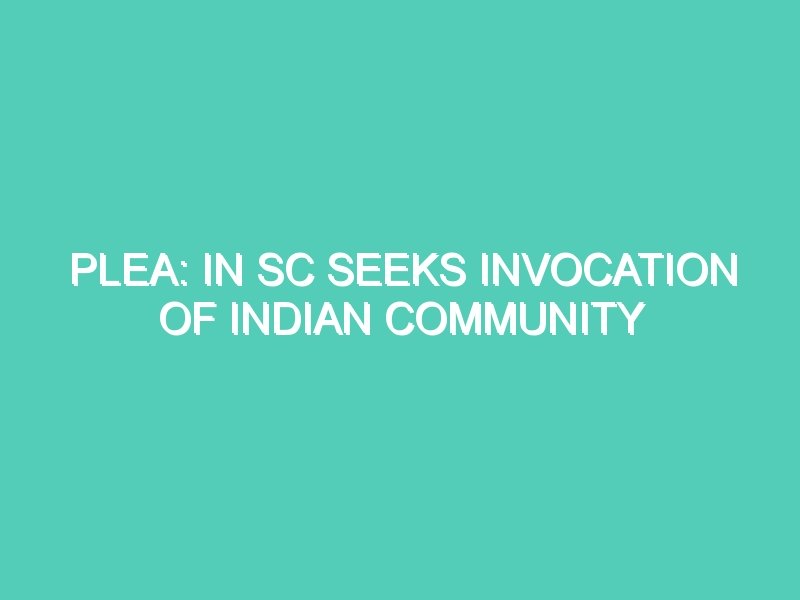[1]In the outlooks of, since the lockdown has been put, distressing the lives of millions of migrants in the nation and across the nations including the migrant workers, labourers and etc.
With this the government came up with a plan as an standard operating procedure for evacuating all the Indian nationals a grounded in different foreign states across the continent which includes migrant labourers, pregnant women , or an elderly individual stranded aboard.
[2]But in case of bearing the tickets, the passengers are responsible for bearing the cost of ticket and even accessing the quarantine facilities, which create a quite chaos amongst the migrant labourers stranded abroad.
[3]In regards to this a Plea was filed in the Supreme court and asked to seek directions by looking into the Indian community welfare fund which aims and designs to help and assistance those Indian nationals stranded abroad and distressed and emergencies to be used as legal assistance.
The petition was initiated and introduced by the NGO Pravasi Legal Cell, through Advocate Jose Abraham, with respect to, by sought assistance from ICWF with the knowledge and considering the current and recent SOP (standard operating protocol) dated May 5,2020 by the government to repatriated and evacuate the Indian citizens form overseas at their own fixed fare. It notes that setting a repatriation tariff at a time of misery will further strain migrant workers who are already out of work and adequate housing, putting them in a precarious situation residing outside the region.
[4]In considering this situation it has created huge chaos and misery amongst those migrant workers stranded abroad, since they have to pay or bear the cost of flying back to their nation, at their own fixed fare stated by the government, it has led to distress and anxiety amongst them.
The petition was filed under the article 32 of the constitution of India for issuance of a writ in the nature ofmandamus to direct the respondents to makeappropriate use of Indian community welfare fundto repatriate the economically weaker Indianexpatriates including migrant labourers strandedin gulf countries.
The nature of injuries caused or expected to be caused to the public is that the poor migrant workers in the Gulf countries are adversely impacted by the Respondents’ intention to impose charges or repatriation in these periods of testing because they have already lost their employment and are working in precarious situation in the Gulf.
The plea seeks to avers that the “vast majority of Indian expatriates in the gulf countries are involved in the low-skilled labour, who are passing through the adverse challenging times”, fixing the fare would further burden and encumbrance all the migrant labourers left without any jobs or employment’’.
The reasons are as followed that would create a clamour among these labourers, Since A huge number of Indian expatriates in the Gulf countries are engaged in low-skilled labour, who are undergoing difficult times and are unable to fulfil their basic needs in a precarious situation of unemployment stemming from the COVID pandemic.
[5]Meanwhile imposing a repatriation tariff at a period of hardship will further hinder and distress these migrant labourers who are still out of jobs and in proper housing, bringing them into a precarious situation residing abroad.
Subsequently the lives of Indian migrant workers that have been quarantined in chronically overcrowded labour camps after the lockdown in many Gulf States and who lack adequate water and sanitation ensures the employees are probably less likely to defend themselves against the virus.
The proximity of workers in crowded camps to one another does not often require some form of social distancing. A typical Gulf state Labour accommodation is home to hundreds of thousands of people, most of whom live in crowded dormitories, sometimes crammed eight or ten in a bed,making it extremelydifficult to stop the transmission of thevirus. Communal kitchens and toilets shared byscores of men are often unsanitary and cakedin grimed.
According to my outlooks and insight analysis of the Indian community welfare fund was setup in 2009, main objective to giving assistance and supporting the Indian nationals abroad in times of crisis and emergencies in ‘extremely worthy situations’ on the basis of ‘means checked.’ ICWF has also been a vital help in the immediate evacuation of Indian citizens from war areas, countries hit by natural disasters and other challenges.
There are stated guidelines which talks about the ICWF, it has been further revised to make them more broad based and expand the scope of welfare measures that can be protracted through these fund. These swotted ICWF guiding principles have been operational w.e.f September 1st 2017 following the approval of the Union Cabinet. They are expected to provide Indian missions and posts abroad greater flexibility and litheness in swiftly addressing to appeals for assistance and support by overseas Indian nationals. These revised guidelines follow some main key areas:
Assisting Overseas Indian nationals in distress situations
- Boarding and lodging in a budget category or shelters operated by Mission / Post or NGOs empanelled with Mission for eligible distressed Indian citizens abroad on a means checked.
- The air passage should be given to the Indian nationals stranded abroad.
- Legal Assistance on a means tested basis to deserving overseas Indian nationals who have committed minor crimes, offences or have been falsely implicated by their employer and put in jails; fishermen/seamen/sailors/Indian students in distress;
- Legal/financial assistance to Indian women abandoned/ cheated / abused by their NRI/PIO or foreign spouses (up to seven years after their marriage.
- Payment of minimal fines and punishments for mild offenses / crimes against Indian nationals; unauthorized stay in the host country, where prima facie the worker is not at fault, and release of Indian nationals from prison / detention centre
- The transportation for the corporeal or mortal remains and expenditure on incidentals Of the deceased Indian national to India or local cremation / burial of the deceased in cases when the employer, provider or insurance firm is unable or unable to do so according to the arrangement and the family cannot bear the costs.
- The emergency medical assistance or care on the basis to overseas Indians who are involved in an accident (with serious life threatening injuries) have life-threatening medical conditions or suffer a serious disability.
Support for Community Welfare activities
All the Indian Missions and posts Expenditure on community events relating to the Indian community can be incurred abroad subject to availability of funds, such as:
- On the way to indorse into promoting the Indian cultureOrganization of cultural programs by recognized Indian Majority ethnic organisations at major Indian Festivals, National Indian Days; Indian Culture Programs by recognized local artists or Indian artists located in India etc.
- The payment for the honorarium teachers and languages or art has been taught.
- Indian student welfare events to arrange Annual Day for Indian students at universities / educational institutions to address problems, issues faced by Indian students including their visa, residency status, work permit, economy, welfare and other issues with student participation.
However in the case of IN FRANCHIS CORALIE MULLION V. UNION TERRITORY OF DELHI (1981) 1 SCC 608 held as under The fundamental Right to life which is the most precious human right and which forms the ark of all other rights must therefore be interpreted in a broad and expansive spirit so as to invest it with significance and validity which may endure for years to come and enhance the dignity of the individual and the worth of the human person.
The right to life enshrined in Article 21 cannot be restricted to mere animal existence. It means something much more than just physical survival…… Every limb or faculty through which life is enjoyed is thus protected by Article 21 and a fortiorari, this would include the faculties of thinking and feeling.
Now deprivation inhibited by Article cannot be completely or partly lost or partly damaged by either limb or staff. Moreover, both forms of deprivation are influenced by Article 21, whether chronic or temporary deprivation is 16 andmoreover, deprivation is not an act that is full once and for all: it is a continuous act and, as long as it lasts, it must be in compliance with the legal procedure.
Therefore any act which damages or injures or interferes with the usage of any person’s limb or faculty, either permanently or temporarily, will be inhibited under Article 21.
We think that the right to life includes the right to live with human dignity and all that goes along with it, namely, the bare necessaries of life such as adequate nutrition, clothing and shelter and facilities for reading, writing and expressing one-self in diverse forms, freely moving about and mixing and commingling with fellow human beings.
The magnitude and content of the components of this right will, of course, depend on the extent of the country’s economic growth, but it must involve, in every view of the 17th case, the right to basic needs of existence and also the right to carry out all those functions and activities which constitute the bare expression of the human self.
Every act that offends or impairs human integrity will constitute protanto deprivation of this right to live, and it will have to be in accordance with the lawful, fair and just procedure defined by statute that is the measure of other fundamental rights.
For the reason these migrant workers are the very much citizens of this nation, yet the respondents which is Union Of India fails to take this into the consideration are under constitutional obligation to protect their interest in this extraordinary time which has threatened the very existence of the human race.
In the other case of In M. NAGRAJ V. UNION OF INDIA, (2O06)8SCC212,
This Honourable Court’s Constitutional Bench affirmed the inalienability of human rights of all human beings, its axiomatic value to all human life and the State’s 18 obligations to promote it:
The individual’s rights, liberty and freedoms are not just to be secured from the State, they should be supported by it … This is the State’s responsibility not only to protect the dignity of the Lutman but also to promote it by taking meaningful measures in that direction.
There is no clear concept of a human integrity. This applies to a human being’s intrinsic value and has to be valued. Can’t drive it further. Do not offer it. This always is. By virtue of his life every human being has dignity.
IN MY OPINION
According to my insights , the government is taking good step bring back its Indian nationals deserted in the other foreign states, but asking them to pay their own fare for the ticket and quarantine facilities, is not suitable for the migrant labourers working abroad.
During the novel Coronavirus pandemic, many stranded Indian migrant workers who are jobless would not be able to pay the charge for repatriation. It is contended.
These workers are low-skilled labourers, due to the pandemic , the government proclaimed the lockdown which led to the shutting down of industries and workshops, leaving thousands of them to be jobless without their wages not being paid to them even after the government appeal.
They do not have any food to eat, no money, left without the security,home live in cramped dormitories, often packed eight or 10 to a room, making it extremely difficult to stop the transmission of the virus.
However the government must also take into account the plight of migrant workers who have already lost their employment and live in wretched situations in the Gulf countries, and make use of funds such as the ICWF currently accessible to cover the costs of these vulnerable Indian expatriates.
The government can use the ICWF fund, for these migrant workers to pay for their tickets and quarantine facilities .
Article Written By-Sakshi Mehta
[1]https://mea.gov.in/icwf.htm
[2]https://images.assettype.com/barandbench/2020-05/9eb0dcaf-9b6d-4809-aedd-ebbdc9f0e379/PLC_WP__ICWF.pdf
[3]https://www.businessinsider.in/india/news/covid-19-plea-in-sc-seeks-direction-to-centre-to-help-migrant-workers-stuck-in-the-gulf/articleshow/75083668.cms
[4]https://www.thehindu.com/news/national/covid-19-plea-in-sc-wants-govt-to-bring-back-migrants-stranded-in-gulf/article31312059.ece
[5]https://www.livelaw.in/top-stories/plea-in-sc-seeks-invocation-of-indian-community-welfare-fund-for-repatriation-of-economically-weaker-citizes-migrant-labourers-stranded-abroad-156328



